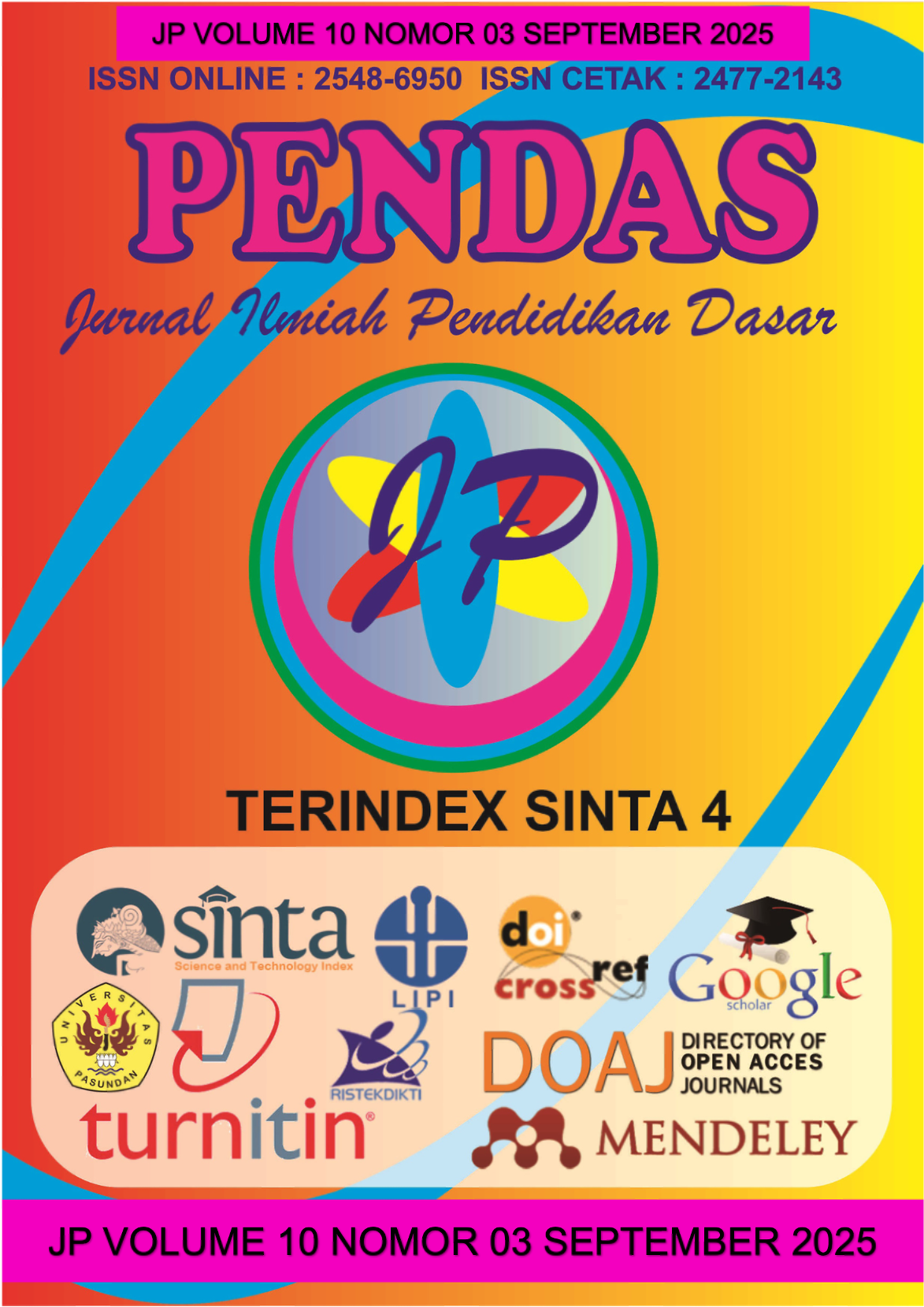PENGARUH PENGGUNAAN MULTIMEDIA PEMBELAJARAN BERBASIS WORDWALL TERHADAP MOTIVASI BELAJAR PADA MATA PELAJARAN PENDIDIKAN PANCASILA KELAS V SDN 1 GARAWANGI
DOI:
https://doi.org/10.23969/jp.v10i03.31455Keywords:
Wordwall-Based Multimedia, Learning MotivationAbstract
This study aims to: (1) Determine students’ learning motivation before and after
using Wordwall-based learning multimedia in the Pancasila Education subject for
fifth-grade students at SDN 1 Garawangi. (2) Examine whether the use of
Wordwall-based learning multimedia affects students’ learning motivation in the
Pancasila Education subject for fifth-grade students at SDN 1 Garawangi. This
research uses a quantitative approach. The research design applied is a Quasi-
Experimental Non-Equivalent Control Group Design. This type of design aims to
test a causal relationship between a treatment (intervention) given to a certain
group by comparing it to another group that does not receive any treatment. In this
study, the population consisted of all fifth-grade students at SDN 1 Garawangi,
while the sample included 23 students in class Va (control group) and 26 students
in class Vb (experimental group). The average posttest score in the control class
(Va) was 85.7, and the average score in the experimental class (Vb) was 91.4,
showing an increase of 6.76%. Based on the Independent Sample T-Test results
in the table above, the significance value in Levene’s Test was 0.157 > 0.05,
indicating that the data had equal variances (equal variances assumed). In the t-
test for Equality of Means section, the significance value (Sig. 2-tailed) was 0.001
< 0.05, and the t-value was -3.494, which means there was a significant difference
between the control and experimental groups. Therefore, it can be concluded that
the use of Wordwall-based learning multimedia applied in the experimental group
significantly influenced student learning outcomes compared to the control group.
Downloads
References
Agustianti, R., Nussifera, L.,
Wahyudi, Angelianawati, L.,
Meliana, I., Sidik, E. A. N.,
Nurlaila, Q., Simarmata, N.,
Himawan, I. S., Pawan, E., &
Ikhram, F. (2022). Metode
penelitian kuantitatif &
kualitatif. Tohar Media.
Agustina, M., & Bahri, S. (2024).
Pengaruh model pembelajaran
cooperative script terhadap
kemampuan komunikasi
matematis pada siswa kelas IV
SDN 1 Blang Mangat. Jurnal
Pendidikan, 5(1), 41–55.Akhyar, S. M., & Dewi, D. A. (2022).
Pengajaran pendidikan
Pancasila di sekolah dasar
guna mempertahankan
ideologi Pancasila di era
globalisasi. Jurnal
Kewarganegaraan, 6(1),
1541–1546.
https://journal.upy.ac.id/index.p
hp/pkn/article/view/2772
Anis, F., Punggeti, R. N., & Nugroho,
P. A. (2024). Dimensi
pembelajaran pendidikan
Pancasila pada kurikulum
merdeka di tingkat sekolah
dasar. Jurnal Paramaedutama,
1(4), 287–297.
https://nafatimahpustaka.org/jp
e/article/view/382/228
Elpin, A., S, H. T. M., & Karolina, V.
(2024). Efektivitas
pembelajaran materi
pembangkit listrik di kelas VI
SD: Perbandingan antara
pembelajaran melalui
membaca dan menyimak
video. Jurnal Pendidikan,
10(April), 383–396.
Fahrudin, F., & Ulfah, M. (2023).
Peranan guru dalam
meningkatkan motivasi belajar
siswa. Jurnal Multidisiplin
Indonesia, 2, 1304–1309.https://jmi.rivierapublishing.id/i
ndex.php/rp
Fahrurrazi, F., Setia, S., &
Jayawardaya, P. (2024).
Meningkatkan motivasi belajar
siswa SD melalui metode
pembelajaran interaktif.
Bahasa dan Budaya, 2(3),
101–110.
https://doi.org/10.61132/seman
tik.v2i3.776
Haliza, V. N., Dewi, D. A., & Mulyana,
A. (2024). Pengaruh
penggunaan media
pembelajaran interaktif
Wordwall terhadap
pemahaman konsep siswa
dalam mata pelajaran
pendidikan Pancasila di kelas
IV. Jurnal Pendidikan
Tambusai, 8, 16195–16221.
Harahap, N. F., Anjani, D., & Sabrina,
N. (2021). Analisis artikel
metode motivasi dan fungsi
motivasi belajar siswa.
Indonesian Journal of
Intellectual Publication, 1(3),
198–203.
https://doi.org/10.51577/ijipubli
cation.v1i3.121
Hidayati, R., Triyanto, M., Sulastri, A.,
& Husni, M. (2022). Faktor
penyebab menurunnya
motivasi belajar siswa kelas IV
SDN 1 Peresak. Jurnal
Educatio FKIP UNMA, 8(3),
1153–1160.
https://doi.org/10.31949/educat
io.v8i3.3223 1(01), 34–48.
https://doi.org/10.20961/ijolii.v1
i01.920
Downloads
Published
Issue
Section
License
Copyright (c) 2025 Pendas : Jurnal Ilmiah Pendidikan Dasar

This work is licensed under a Creative Commons Attribution 4.0 International License.














































